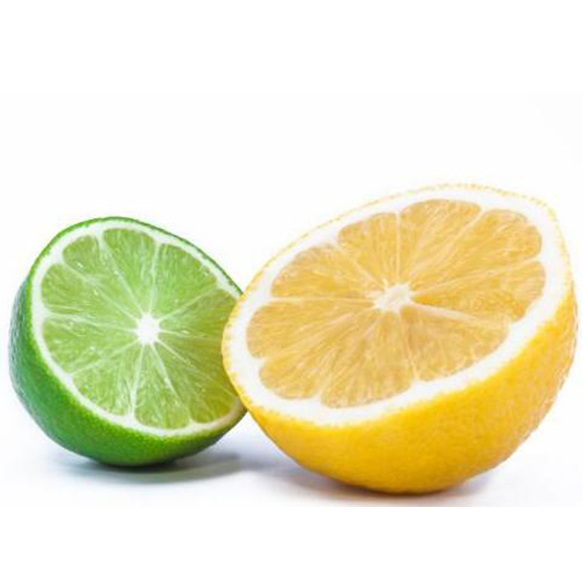While some people think of a lemon and a lime as interchangeable, there are a number of differences between these two fruits, as well as unique health benefits to both!
Lime vs Lemon
A lemon is a fruit of a small evergreen lemon tree (Citrus limon) that is native to Asia. In comparison, lime is actually a hybridized citrus fruit and comes in many different varieties around the world. However, both lime and lemon are from the same citrus family. The shape of a lemon is ellipsoidal, and the ripened fruit is bright yellow in color. On the other hand, lime is typically round and green and are slightly smaller than most lemons.
Note: Although some people may think that limes are simply lemons that haven’t ripened yet, they are sorely mistaken. Lemons are not ripe limes!
Lime vs Lemon Nutrition
Neither lime nor lemon is a rich source of vitamins and minerals but both are low in calories and are an abundant source of vitamin C.
Vitamin C
- Lime: 100 g of lime contains 29 mg of vitamin C, which is 35% of the daily requirement.
- Lemon: 100 g of lemon contains 53 mg of vitamin C, which is 64% of the daily requirement.
(Source: USDA National Nutrient Database)
Other nutrients
- Lime: It is slightly higher in carbohydrates and lower in protein than lemon, but the difference is negligible.
- Lemon: It is high in citric acid as well as phytochemicals, tannins, and polyphenolic compounds.
Lime vs Lemon Taste
Lemon typically has more sugar, which often gives it a sweeter flavor than lime, whereas lime is sour or tart, making it ideal for cocktails and beverages. Consuming pure lemon juice or lime juice can be equally unpleasant experiences, which is why they are usually mixed with other beverages or recipes before being consumed.
While the two fruits clearly have a number of differences, in size, color, nutritional value, and species, the two citrus fruits do have a great deal in common as well.
Health Benefits of Lime & Lemon
These two fruit varieties share many of the same health benefits, as outlined below, making them some of the most popular and important citrus fruits you can add to your diet.
Boost Immunity
Lime and lemon are rich in vitamin C, which is also known as ascorbic acid and it helps strengthen the immune system. This critical vitamin stimulates the production of white blood cells, which are the first line of defense for the body when it is attacked by an illness or infection. According to a study conducted at International Antioxidant Research Centre, King’s College, London, the iron and vitamin C, which are present in citrus fruits, prevents oxidative damage of DNA in healthy cells.
Speed up Healing
Vitamin C, present in lemons and limes, plays a critical role in the production of collagen. Collagen is required for growth and development of muscles, skin cells, tissue, and bones throughout the body. Without vitamin C, the recovery rate of illnesses and injuries would be much slower.
Optimize Digestion
Lemons and limes both contain high levels of dietary fiber, says Dr. Sherry Tanumihardjo, University of Wisconsin‐Madison, Madison, US, in her study. This can easily bulk up the stool, reduce constipation, and eliminate excess gas and bloat. With about 3g of fiber in each fruit, it represents about 10% of the daily recommended amount of fiber.
Boost Circulation
Both of these citrus fruits contain significant levels of iron, which is an important element in hemoglobin. Without proper iron levels, people may suffer from anemia, characterized by weakness, fatigue, cognitive confusion, and light-headedness.
Antioxidant Activity
Citrus fruits like lemons and limes contain high levels of other antioxidants, besides vitamin C, which can counteract the effects of free radicals. According to studies citrus fruits aid in lowering oxidative stress and reducing the risk of chronic diseases such as cancer.
Weight Loss
The high fiber level and low-calorie count make these citrus fruits ideal for weight-loss. These fruits increase satiety without alleviating your calorie count. This, in turn, helps prevent overeating and snacking between meals, which makes it perfect for someone trying to shed some pounds!
How to use lime and lemon?
For those who are passionate about designing and decorating drinks (cocktails and mocktails), should be well aware of the citric acid content in limes and lemons.
- Both lime and lemon with a particular beverage produce different drinks with unique flavors.
- Additionally, lemons due to their tart, refreshing flavor find their applications in various culinary uses more than limes.
Other uses: Lemons are also used in many cleaning products and as an element in natural healing, whereas, limes are used in perfumes and aromatherapy.
Lime or Lemon – Which one is Better?
- Lemons have a slight edge in terms of nutrients, taste, and versatility in cooking and beverages.
- Limes do have a lesser concentration of vitamin C but they can also be used in many ways in cooking and cocktail-making.
However, while both of these fruits are very good for overall health, lemons would likely win the nutritional battle!

